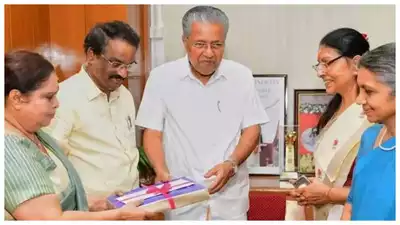Table of Contents
Background Information
The recent report named as Justice K.Hema report reveals some dark realities of the Malayalam film industry. The report submitted to the Kerala government five years ago identified at least 17 forms of exploitation experienced by women working in 30 different categories within the Malayalam film industry.
Key issues included the casting couch, lack of basic amenities, and threats against filing complaints. The committee confirmed the rumoured existence of the practice of “casting couch” in the industry. The committee was established in response to a demand from the Women in Cinema Collective following the abduction and sexual assault of a leading female actor in 2017.
Major concerns include producers warning producers not to cast actors who fall out of favor with them, and the Film Chamber of Commerce issuing NOC to prevent movie releases. The report also highlights the lack of changing rooms or toilet facilities on set, leading to urinary infections for many women.
Junior artists are sometimes treated worse than slaves, with work extending up to 19 hours. The lack of a written contract is exploited by some to deprive actors and technicians of even the remuneration promised orally. The report recommends setting up a civil court-like tribunal to deal with serious issues faced by women employed in the Malayalam film industry.
VIEW THE JUSTICE K. HEMA REPORT PDF
Article Explanation
The Article published in the editorial section of The Hindu Newspaper talks about the recent news where The Justice K. Hema Committee report, released by the Kerala government on August 19, 2024, has sparked a heated discussion about the difficulties women face in the Malayalam film industry.

The report reveals two primary areas of concern: sexual exploitation and assault within the industry, where women are often coerced into providing sexual favours in exchange for professional opportunities, and widespread discrimination against women, who are often denied even the most basic facilities and amenities at work. This discrimination mirrors broader societal attitudes toward women.
The report highlights the ongoing culture of sexual violence and harassment, which is not just a reflection of industry-specific problems but also mirrors broader societal attitudes towards women. The objectification of women and the perpetuation of gender stereotypes contribute to the ongoing culture of sexual violence and harassment.
The issue of workplace harassment has long been recognized in India, with the establishment of Internal Complaints Committees (ICCs) within workplaces, including the film industry. However, the report raises concerns about the effectiveness of ICCs in the film industry, noting that there is a risk of abusers or employers influencing committee members.
The broader issue of ICCs being potentially compromised is not unique to the film industry. The suggestion to completely bypass the established complaints redressal mechanism set out by the legislation may lead to unforeseen challenges. While additional safeguards and accountability measures might help, dismissing the existing system entirely could undermine the legal framework that has been painstakingly developed over the years.
Another significant concern raised by the report is the absence of criminal investigations and prosecutions based on the findings. Critics question why no legal action has been taken against the accused individuals.
The redaction of names in the report, while intended to protect the anonymity of survivors, has made it difficult to pursue justice. The slow pace of trials in sexual assault cases, often due to the overwhelming backlog in India’s judicial system, further discourages survivors from seeking justice.
The report draws parallels to the global #MeToo movement, which gained momentum following the 2017 allegations against Hollywood producer Harvey Weinstein. The findings of the Hema Committee report should serve as a catalyst for much-needed structural reforms within the Indian film industry.
The government must take an active role in addressing the myriad challenges faced by women, particularly those in lower-ranking positions, who often lack basic amenities like adequate sanitation and are subject to deep-seated biases.
join our telegram channel for regular updates of The Hindu Epaper Editorial Explanation-https://t.me/Thehindueditorialexplanation
The Hindu Epaper Editorial Explanation given by Hello Student is only a supplementary reading to the original article to make things easier for the students.
In conclusion, preparing for exams in India can be a daunting task, but with the right strategies and resources, success is within reach. Remember, consistent study habits, effective time management, and a positive mindset are key to overcoming any academic challenge. Utilize the tips and techniques shared in this post to enhance your preparation and boost your confidence. Stay focused, stay motivated, and don’t forget to take care of your well-being. With dedication and perseverance, you can achieve your academic goals and pave the way for a bright future. Good luck!
The Editorial Page of The Hindu is an essential reading for all the students aspiring for UPSC, SSC, PCS, Judiciary etc or any other competitive government exams.
This may also be useful for exams like CUET UG and CUET PG, GATE, GMAT, GRE AND CAT
To read this article in Hindi –https://bhaarat.hellostudent.co.in/
